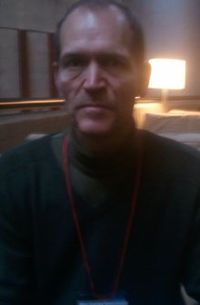
It's an English thing.
Anyway, their top "innovator of the year" title has been bestowed this year on Doug Cutting, for Hadoop. "Overall, the Apache cloud project was seen as a greater catalyst for innovation than WikiLeaks, the iPad and a host of other suggested nominees," the newspaper said.
I can't disagree. Hadoop makes clouds cool. Clouds let things scale. No more 404 messages when a crowd rushes to the rail. No more problems too big to deal with from a desk.
That's transformation you can believe in.
But the award also illustrates a serious problem with open source. Because Doug Cutting isn't a millionaire. He doesn't want to be one. Not because he doesn't then want to be a philanthropist, and not because he wouldn't mind having his own jet plane, mansion or football team.
He's just not interested. He wants to code. He's not a businessman.
I interviewed Doug last year, after he had (reluctantly) agreed to head up the Apache Software Foundation. This is the picture I took then, in a lobby of the Westin Peachtree Plaza.
No serious businessman would let himself be photographed this way. But that's the way of the man. He's not into image, not into money except as a means to an end. (He wants enough to keep his projects going.) He's into code. He likes teams. He's a chef who doesn't want to be on Food Network.
What I found at Apache is a lot of other folks with the same values. It was a bit like going to a journalism conference, in that journalists also care about the work, the ethics of it, the reach of it, the day-to-day grind of it, and don't know or care about how powerless they are, because journalists are people who work for people. Journalists work for publishers, and publishers are businessmen we have to tolerate. But publishers aren't journalists.

This is not a bug in the open source process. It's a feature. But this feature makes it hard for an open source business that practices open source ethics — which are much closer to those of Doug Cutting than Marten Mickos — to scale. That's why business reporters reacted to the idea of Red Hat as a billion dollar company the way you might to an elephant tap dancing.
But open source is powerful. People working together, sharing what they have, will over time beat any team trying to go it alone. So don't worry about Mapr — which claims to have a proprietary Hadoop that works three times faster. Hadoop will beat it in time. No matter how smart the Mapr team is, people working together will overcome any lead. And this, more than anything, is what drives opponents of open source crazy.
Still, the truth about open source remains this.
Red Hat, and every other open source company of any scale, will always be caught between its values and creating value. And it's this tension that will always keep open source suspect in the business press, because in the end it means there is some bottom line other than the bottom line.









